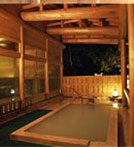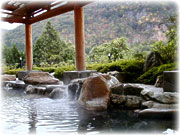
Many ryokans — traditional inns — offer public baths. Photo from Japan National Tourism
Sixth in a series
Taking a public bath in Japan can be a wonderfully relaxing experience — as long as you know the rules.
Our introduction to the baths came at Kyoto’s Funaoka Onsen, located on a nondescript street about a half hour’s walk from our Airbnb.
Here one can slip into a variety of hot and even hotter mineral-water pools, both indoors and out, and remain there until you start to boil. There’s also a sauna in case you need some roasting.
The residual effect is incredibly soothing and the perfect way to unwind after a day spent sightseeing or climbing small mountains.
Funaoka onsen is one of Kyoto’s oldest and finest public baths, though the most picturesque and authentic onsen are in the countryside and fueled by Japan’s multitude of hot springs.
But this onsen offered an excellent introduction. It was apparently not looking for a heavy tourist trade, since there was no English signage outside.
I can understand that, since tourists, including myself, often don’t have a clue as to how to conform to the many customs and rituals attached to taking a public bath in Japan — after all, the practices are centuries old and etched into the souls of the people. Foreign visitors can have a disruptive influence on time-honored traditions.
Like most public baths in Japan nowadays, the baths here are separated by gender, so that piece of potential embarrassment is spared. Men enter through a blue curtain and women through a red. I got that right, at least.
But the unwritten “rules” still hang heavy over the steamy waters, and it seemed as though I were being thoroughly scrutinized by other bathers to make sure I was properly conforming. Or maybe I was just self-conscious.
So here are some do’s and don’ts to help make your first public bathing experience less awkward than mine:
Do: Prepare to get naked.
This one is not negotiable. Remove all items of clothing and whatever else you may wearing and put them in the provided lockers or baskets. No swimsuits allowed.

Traditional hot springs in Hanamaki, Japan. Photo from Japan National Tourism
Do: Wash yourself thoroughly before entering the baths.
Showering back at your hotel doesn’t count. You have to wash up in the changing room or you’ll risk getting the stink eye from other bathers. I made the mistake of washing up in an anteroom sink before reaching the main changing area, and then I had to shower and shampoo all over again to prove that I was clean.
For showering, you will probably be provided a bucket to throw water over yourself and a stool to sit on while doing so. Lather up thoroughly and make a show of it if you want to fit in.
Many onsen will give or sell you soap and shampoo, while others don’t, so it’s a good idea to bring your own to be sure.
Don’t: Carry cameras or smart phones into the baths.
No explanations needed.
Do: Enter the water slowly.
It’s hot!
Don’t: Bring large towels into the baths.
While this might not be a hard-and-fast rule, I regretted bringing a large towel from the Airbnb in with me, since I had nowhere to put it except just outside the pools and it got soaked and useless for drying off.
Many Japanese carry a small hand towel into the baths, often positioning it atop their heads while in the water — but keeping it there takes practice. You can often rent one at the onsen. (You’ll need a small towel to sit on if there’s a sauna.)
Don’t: Let your towel touch the bath water.
If it does get wet — for example, it falls off your head — wring it out outside the pool.
Don’t: Submerge your head in the water, swim in the pools, or splash water on your fellow bathers.
The experience should be peaceful and quiet, though talking (at low volume) is OK.
Do: Check the onsen’s tattoo policy before entering.
Many have a “no tattoos allowed” rule; tattoos are identified with the Yakuza, Japan’s organized crime syndicate. You might be able to cover a small tattoo with a bandage, however.
Don’t: Stay too long in the hot water.
Temperatures in the pools can reach as high as 110 degrees F (about 44 degrees C), so soaking for five to ten minutes at a time is safest. Take a break between soaks and limit your time in the hottest pools to around a half hour total.
Do: Drink plenty of water before and after bathing. Avoid drinking alcohol before bathing, which can be dehydrating. Afterwards, wait a while and then feel free to have a beer if you like.
Don’t: Take a hot shower after bathing; you might wash off the medicinal minerals found in many onsen pools.
Now, all that said, the important thing is not to miss this experience when you’re in Japan — even if you have to get over a little embarassment.
Next up in the series: Surprising Nara, Land of Giant Buddhas and Roaming Deer.












2 Responses to Do’s and Don’ts of Public Bathing in Japan